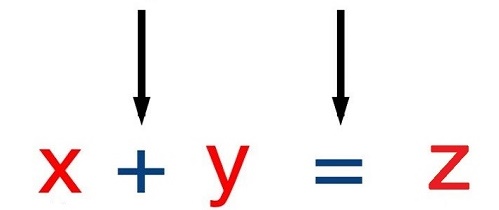JavaScript Operators
The Addition Operator + adds numbers:
The Assignment Operator = assigns a value to a variable.

JavaScript Assignment
The Assignment Operator (=) assigns a value to a variable:
Assignment Examples
let x = 10;
Try it Yourself »
// Assign the value 5 to x
let x = 5;
// Assign the value 2 to y
let y = 2;
// Assign the value x + y to z:
let z = x + y;
Try it Yourself »
JavaScript Addition
The Addition Operator (+) adds numbers:
JavaScript Multiplication
The Multiplication Operator (*) multiplies numbers:
Types of JavaScript Operators
There are different types of JavaScript operators:
- Arithmetic Operators
- Assignment Operators
- Comparison Operators
- String Operators
- Logical Operators
- Bitwise Operators
- Ternary Operators
- Type Operators
JavaScript Arithmetic Operators
Arithmetic Operators are used to perform arithmetic on numbers:
| Operator | Description |
|---|---|
| + | Addition |
| - | Subtraction |
| * | Multiplication |
| ** | Exponentiation (ES2016) |
| / | Division |
| % | Modulus (Division Remainder) |
| ++ | Increment |
| -- | Decrement |
Note
Arithmetic operators are fully described in the JS Arithmetic chapter.
JavaScript Assignment Operators
Assignment operators assign values to JavaScript variables.
The Addition Assignment Operator (+=) adds a value to a variable.
| Operator | Example | Same As |
|---|---|---|
| = | x = y | x = y |
| += | x += y | x = x + y |
| -= | x -= y | x = x - y |
| *= | x *= y | x = x * y |
| /= | x /= y | x = x / y |
| %= | x %= y | x = x % y |
| **= | x **= y | x = x ** y |
Note
Assignment operators are fully described in the JS Assignment chapter.
JavaScript Comparison Operators
| Operator | Description |
|---|---|
| == | equal to |
| === | equal value and equal type |
| != | not equal |
| !== | not equal value or not equal type |
| > | greater than |
| < | less than |
| >= | greater than or equal to |
| <= | less than or equal to |
| ? | ternary operator |
Note
Comparison operators are fully described in the JS Comparisons chapter.
JavaScript String Comparison
All the comparison operators above can also be used on strings:
Note that strings are compared alphabetically:
JavaScript String Addition
The + can also be used to add (concatenate) strings:
The += assignment operator can also be used to add (concatenate) strings:
Example
let text1 = "What a very ";
text1 += "nice day";
The result of text1 will be:
What a very nice dayNote
When used on strings, the + operator is called the concatenation operator.
Adding Strings and Numbers
Adding two numbers, will return the sum, but adding a number and a string will return a string:
Example
let x = 5 + 5;
let y = "5" + 5;
let z = "Hello" + 5;
The result of x, y, and z will be:
10
55
Hello5
Note
If you add a number and a string, the result will be a string!
JavaScript Logical Operators
| Operator | Description |
|---|---|
| && | logical and |
| || | logical or |
| ! | logical not |
Note
Logical operators are fully described in the JS Comparisons chapter.
JavaScript Type Operators
| Operator | Description |
|---|---|
| typeof | Returns the type of a variable |
| instanceof | Returns true if an object is an instance of an object type |
Note
Type operators are fully described in the JS Type Conversion chapter.
JavaScript Bitwise Operators
Bit operators work on 32 bits numbers.
Any numeric operand in the operation is converted into a 32 bit number. The result is converted back to a JavaScript number.| Operator | Description | Example | Same as | Result | Decimal |
|---|---|---|---|---|---|
| & | AND | 5 & 1 | 0101 & 0001 | 0001 | 1 |
| | | OR | 5 | 1 | 0101 | 0001 | 0101 | 5 |
| ~ | NOT | ~ 5 | ~0101 | 1010 | 10 |
| ^ | XOR | 5 ^ 1 | 0101 ^ 0001 | 0100 | 4 |
| << | left shift | 5 << 1 | 0101 << 1 | 1010 | 10 |
| >> | right shift | 5 >> 1 | 0101 >> 1 | 0010 | 2 |
| >>> | unsigned right shift | 5 >>> 1 | 0101 >>> 1 | 0010 | 2 |
The examples above uses 4 bits unsigned examples. But JavaScript uses 32-bit signed numbers.
Because of this, in JavaScript, ~ 5 will not return 10. It will return -6.
~00000000000000000000000000000101 will return 11111111111111111111111111111010
Bitwise operators are fully described in the JS Bitwise chapter.